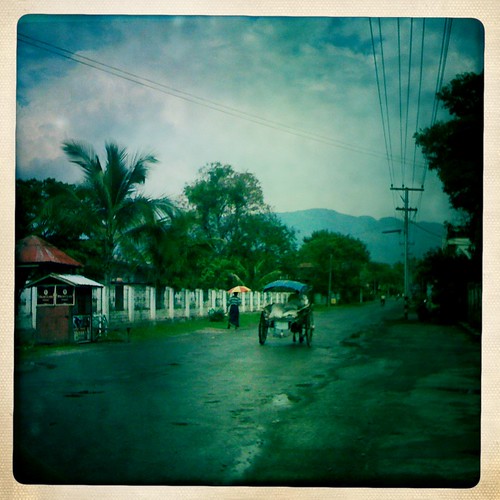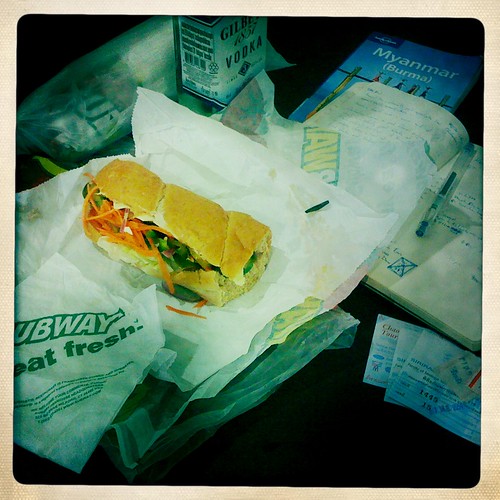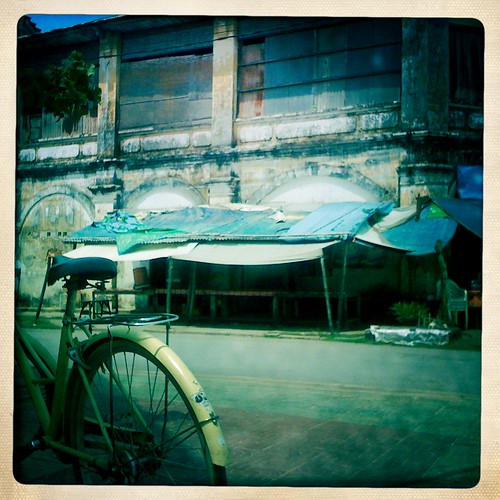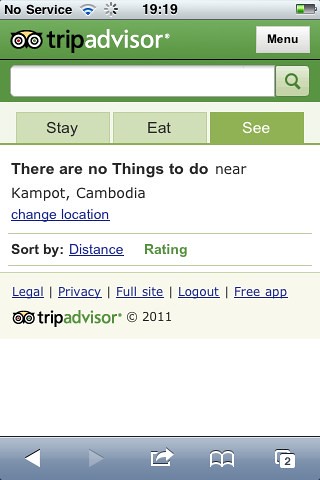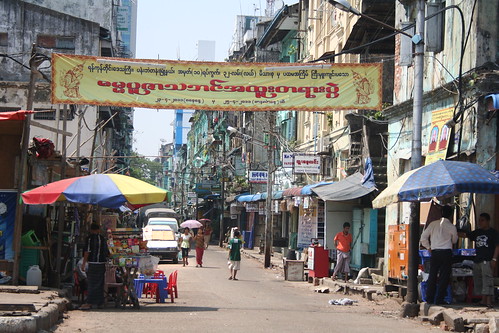
|
|
downtown street in Yangon, originally uploaded by Mister Wind-Up Bird. |
Yangan is decrepit. There’s almost nothing new anywhere, and what exists is barely being maintained. Blocks of concrete housing sit with streaks of black mold replacing long-forgotten paint jobs. Sidewalks are cracked and broken, exposing sewers and drains beneath. Taxis drive with shot suspension, broken windows and missing door handles. At night, their yellow headlights provide most of the illumination for a teeming downtown of sidewalk shopping and dining otherwise lit only by the occasional fluorescent light of a shop or temple. Like the rest of the country, the city seems like it’s in a holding pattern, a combination, I suspect, of the country’s isolation and poverty under the ruling junta and uncertainty about what could possibly follow. Along the waterfront are rows of massive, grand colonial-era buildings once occupied by the British, and later by the government of the military dictatorship. Then, in 2005, the generals arbitrarily built a new capital called Naypyidaw in the middle of nowhere and the government offices picked up and went. Now these buildings lay empty and boarded up. Despite their prime location and architectural beauty, nobody seems to have the resources or interest to turn them into offices or hotels. So, they wait, too.
But this doesn’t mean Yangon has forgotten how to party! Life may be hard and the future uncertain, but the Burmese are hardly a dour people. We arrived the first day of Thingyan, the four-day Burmese new year, and were soon after joined by Janelle’s fun-loving old school chum Mark, who we had been hanging out with in Bangkok where he’s living the expat life working a prestigious job for a prestigious company I won’t say the name of here.
During Thingyan, the Burmese spend four days drinking, eating, dancing, and dousing each other with water. Actually, “dousing” doesn’t quite cover it: during Thingyan, the buckets and hoses come out in full force, and Buddha help you if you want to stay dry. Our introduction to Thingyan came when we got into a taxi with every surface covered in Scotch tape and plastic sheeting, and almost immediately a pickup full of teenagers pulled up next to us and a good ten liters of water was suddenly tossed into the windows directly onto our laps. That was pretty much the end of our being outside the hotel and dry simultaneously.
On the last–and wildest–day of Thingyan, Mark was able to get the young concierge of our hotel to spend a few hours of his day off to hang out with us. He took us to party central, where huge temporary stages full of young Burmese take hoses to hand and drench other young Burmese who cruise by in the backs of old Japanese flatbed trucks. Â On the street, people drink and dance as Burmese hip-hop and Lady Gaga are blasted through concert speakers. The whole experience is decidedly more music festival than religious ritual.
Very few Westerners take part in this part of the Thingyan festivities. I think we saw maybe four or five in total. We were certainly not unwelcome, though! Apparently, dousing the round-eyes is great fun. Everybody wanted to throw water on us, bust a few moves and then shake our hands and throw out whatever random English phrases they had at their disposal. A group of girls insisted on all kissing Janelle’s cheek, and we almost lost Mark when a crowd of teenagers grabbed at him trying to shake his hands despite the fact a firehose was simultaneously trained on his face. But our friend the concierge kept us safe and all together, and negotiated beer and taxi prices for us. In exchange, we bought him all the Thai beer he could drink (a lot, it turned out) and, I’m sure entertained him with our mixture of cluelessness and enthusiasm.
I suspect without Mark and the concierge we wouldn’t have done it, which would have been a shame. It was really an incredible feeling, walking the streets of Yangon at ten in the morning with a beer in one hand and a gaggle of Burmese teenagers trying to shake the other, while hoses blast you with cold water and truckloads of cheering partiers trundle by beside you. Â Lemme tell you, if you suffer from low self-esteem, being a foreigner at a Yangon Thingyan will fix you right quick.
